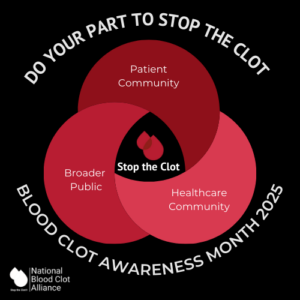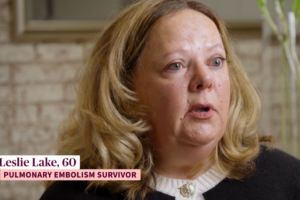Blood Clot Awareness Month 2025: Do Your Part to Stop the Clot
Take Action During March for Blood Clot Awareness Month
Each year, 900,000 are affected by blood clots, claiming 100,000 lives and ranking as a leading cause of preventable hospital deaths in the U.S. Early prevention, prompt recognition, and effective treatment are crucial for survival.
The theme of Blood Clot Awareness Month 2025 is Do Your Part to Stop the Clot: A Call to Action. Everyone—the patient community, health care community, and broader public—plays a pivotal role in saving lives:
Patient Community: Survivors | Caregivers | Families
Sharing your story or your loved one’s story can help others recognize the signs and symptoms, know when to seek treatment, and know they’re not alone.
Share, support, and advocate — your story is your strength.
Health Care Community: Clinicians | Researchers | Hospitals | Medical Societies
Blood clots can affect anyone, regardless of age or appearance. Challenge your assumptions about what a blood clot patient looks like, listen to patients, provide resources, thoroughly investigate symptoms, and explore new treatments to ensure better outcomes.
Collaborate, educate, and take action — your commitment saves lives.
Broader Public: Citizens | Elected Officials | Community Organizations
Blood clots are more common than many realize, and they can be deadly, but they’re preventable. Learn if you’re at risk, know the signs and symptoms, and share this vital information with others to help save lives.
Take action, inform others, and help create a safer, healthier world.

Ready to make a difference?
Join NBCA’s 31-day 100,000 Reasons Challenge from March 1-31 and honor the lives lost to blood clots each year.
By moving your body however you choose and tracking your active minutes, you’re preventing blood clots, raising awareness, and supporting research. Your participation amplifies the stories of those we’ve lost and shows our collective commitment to honoring their memories. If you’ve lost a loved one from blood clots, may also choose to share a message about them on our tribute wall.
Make every active minute count, whether it’s dancing, running, dog walking, yoga, rowing, or whatever activity you enjoy. Join the Challenge today and help save lives!
Other Ways To Support BCAM 2025
Download and Share NBCA's Social Media Toolkit and Action Guide
We encourage action with this toolkit, offering essential messaging, digital tools, and resources.
Make a Donation
Your tax-deductible gift will immediately go to work helping to advance the prevention, early diagnosis, and successful treatment of life-threatening blood clots.
Send a Letter to Your Congressional Representatives
Did you know there is little federal funding for blood clot education and awareness efforts in the U.S.? Help NBCA advocate for funding to support new education and awareness programs to reach more people with life-saving information about blood clots. Just type in your zip code and send an email or letter to your Congressional representatives. Your voice matters!
Share Your Story
On our Patient Stories page, you’ll find a collection of narratives from a wide variety of blood clot patients. Our goal is to offer comfort and hope to those affected by blood clots through the experiences of those who’ve walked a similar path. In sharing your story, we hope you’ll be empowered to move forward as you help educate others through your own experience.
Share Your Loved One's Story
To honor the 100,000 individuals lost to blood clots annually in the U.S., we invite their loved ones to share their stories, which we will share on our website and social media. Sharing your loved one’s story is a meaningful action you can take to help raise awareness, educate others about signs and symptoms, promote prevention, and foster a supportive community for those affected.
Frequently Asked Questions (FAQs)
What will NBCA be doing during Blood Clot Awareness Month?
- Working to raise $100,000 and reach 100,000 people in honor of the 100,000 who die each year from preventable blood clots through the 100,000 Reasons Challenge.
- Launching the B.L.A.C.K. Church Bus Tour (Black Lives Advocating for Clot Knowledge) and visiting Black churches in six key cities across the Southern U.S., home to more than 55% of the Black population. Support the bus tour.
- Staff and volunteers are gathering in Washington, DC to meet with members of Congress to advocate for an increase funding for blood clot education and awareness.
- Honoring the lives of those who have died of blood clots by sharing their stories.
- NBCA Community Thrombassadors are organizing awareness events around the country.
Why is it important to raise blood clot awareness?
- Every year, more than 100,000 people die from blood clots in the U.S. Yet, blood clots are often preventable and can be safely treated when caught in time.
- Less than 6% of Americans know what blood clots are and how to prevent them, yet they affect as many as 900,000 Americans every year.
- Every six minutes in the U.S., someone dies of a blood clot, or 274 people per day.
- The overall incidence of venous blood clots is up to 60% higher in Black patients compared to white patients.
- A blood clot in the lung is one of the most common causes of pregnancy-related death in the U.S.
- Blood clots are the second leading cause of death in cancer patients, aside from cancer itself.
How did Blood Clot Awareness Month start?
In 2003, while covering the war in Iraq for NBC News, journalist David Bloom died of a blood clot that formed in his leg and traveled to his lungs.
In memory of Bloom, a U.S. Senate bill in 2005, sponsored by Arlen Specter (R-PA), declared March Deep Vein Thrombosis Awareness Month.
In 2009, Representatives Lois Capps (D-CA) and Cathy McMorris Rodgers (R-WA) came together in an bipartisan effort to reinforce March as a time to focus on blood clots. Capps’ husband Walter died of a pulmonary embolism (PE) in 2006, and a friend and mentor of McMorris Rodgers, Rep. Jennifer Dunn, died of a PE in 2007.
Why is it called Blood Clot Awareness Month?
In 2010, NBCA conducted a nationwide survey that showed that 82% of the general population understood the term “blood clot,” while only 21% knew the meaning of “deep vein thrombosis (DVT)” and 16% knew the meaning of “pulmonary embolism (PE).”
This was a problem, as the month was named Deep Vein Thrombosis Awareness Month, but it was not catching on.
As a result, NBCA officially commemorated March as Blood Clot Awareness Month in 2013, and we’ve been marking it every year since.




